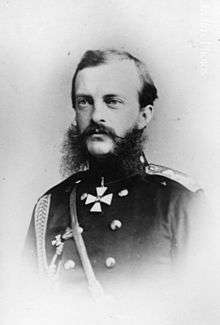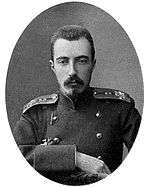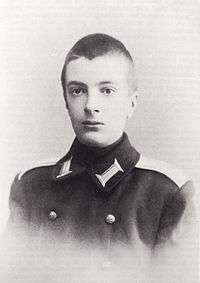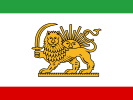Grand Duke Michael Nikolaevich of Russia
Grand Duke Michael Nikolaevich of Russia (25 October 1832 – 18 December 1909) was the fourth son and seventh child of Tsar Nicholas I of Russia and Charlotte of Prussia. He was the first owner of the New Michael Palace on the Palace Quay in Saint Petersburg.
| Grand Duke Michael Nikolaevich | |
|---|---|
 | |
| Born | 25 October 1832 Peterhof, Saint Petersburg, Russian Empire |
| Died | 18 December 1909 (aged 77) Cannes |
| Spouse | Princess Cecile of Baden
( m. 1857; died 1891) |
| Issue | Grand Duke Nicholas Mikhailovich Anastasia Mikhailovna, Grand Duchess of Mecklenburg-Schwerin Grand Duke Michael Mikhailovich Grand Duke George Mikhailovich Grand Duke Alexander Mikhailovich Grand Duke Sergei Mikhailovich Grand Duke Alexei Mikhailovich |
| House | Romanov |
| Father | Nicholas I of Russia |
| Mother | Charlotte of Prussia |
| Military career | |
| Allegiance | |
| Service/ | |
| Years of service | 1846–1909 |
| Rank | Generalfeldmarschall |
| Commands held | Caucasus Military District |
Marriage and issue
On 16 August 1857, he married Princess Cecilie of Baden (1839–1891), daughter of Leopold, Grand Duke of Baden and Sophie of Sweden. Cecily adopted the name Olga Fedorovna, and had the following children with him:
| Name | Birth | Death | Spouse (dates of birth & death) and children[1][2] | |
%2C_young.jpg) |
Grand Duke Nicholas Mikhailovich of Russia, | 26 April 1859 | 28 January 1919 | Unmarried. He was killed by the Bolsheviks during the Russian revolution; no issue |
 |
Grand Duchess Anastasia Mikhailovna of Russia | 28 July 1860 | 11 March 1922 | Married 1879 (24 January), Frederick Francis III, Grand Duke of Mecklenburg-Schwerin (1851–1897); 1 son, 2 daughters. |
 |
Grand Duke Michael Mikhailovich of Russia | 16 October 1861 | 26 April 1929 | Married 1891 (26 February), Sophie of Merenberg (1868–1927); 1 son, 2 daughters. |
| Grand Duke George Mikhailovich of Russia | 23 August 1863 | 28 January 1919 | Married 1900 (12 May), Princess Maria of Greece and Denmark (1876–1940); 2 daughters. He was killed by the Bolsheviks during the Russian revolution | |
.jpg) |
Grand Duke Alexander Mikhailovich of Russia | 13 April 1866 | 26 February 1933 | Married 1894 (6 August), Grand Duchess Xenia Alexandrovna of Russia (1875–1960); 1 daughter, 6 sons. |
| Grand Duke Sergei Mikhailovich of Russia | 7 October 1869 | 18 July 1918 | Unmarried. He was killed by the Bolsheviks during the Russian revolution; no issue | |
 |
Grand Duke Alexei Mikhailovich of Russia | 28 December 1875 | 2 March 1895 | Unmarried; no issue |
He served 20 years (1862–1882) as the Governor General of Caucasia, being seated in Tbilisi, the town which most of his children remembered as the home of their childhood. In the course of his life, four members of his family ruled as Emperors of Russia: his father, Nicholas I; his brother, Alexander II; his nephew, Alexander III; as well as his grand-nephew, Nicholas II, whose second daughter, Grand Duchess Tatiana, the Grand Duke was godfather to. He died in Cannes, France, on 18 December 1909. He was the last surviving legitimate grandchild of Paul I of Russia.
Honours
- National orders and decorations[3]
- Knight of St. Andrew, 1832
- Knight of St. Alexander Nevsky, 1832
- Knight of the White Eagle, 1832
- Knight of St. Anna, 1st Class, 1832
- Knight of St. George, 4th Class, July 1854; 2nd Class, February 1864; 1st Class, September 1877
- Knight of St. Vladimir, 1st Class, January 1863
- Golden Saber "For Bravery", 1863; Golden Sword "For the conquest of the Caucasus", in Diamonds and Emeralds, February 1864
- Knight of St. Stanislaus, 1st Class, November 1865
- Foreign orders and decorations[3]
.svg.png)
- Knight of the Black Eagle, 14 June 1838[4]
- Grand Cross of the Red Eagle, 14 June 1838
- Pour le Mérite (military), 8 December 1871; with Oak Leaves, 28 November 1877[5]

- Grand Cross of the Württemberg Crown, 1846
- Grand Cross of the Military Merit Order, 10 September 1878



.svg.png)
.svg.png)
- Knight of the House Order of Fidelity, 1852
- Grand Cross of the Zähringer Lion, 1852
- Grand Cross of the Military Karl-Friedrich Merit Order, 1864
.svg.png)

.svg.png)
.svg.png)

.svg.png)
.svg.png)

.svg.png)


.svg.png)


Ancestors
References
- Whitaker's Almanack (1900) Facsimile Reprint 1998, London: Stationery Office, ISBN 0-11-702247-0, p. 86
- Whitaker's Almanack, 1993, Concise Edition, (ISBN 0-85021-232-4), pages 134–136
- Russian Imperial Army - Grand Duke Michael Nikolaevich (In Russian)
- Liste der Ritter des Königlich Preußischen Hohen Ordens vom Schwarzen Adler (1851), "Von Seiner Majestät dem Könige Friedrich Wilhelm IV. ernannte Ritter" p. 20
- Lehmann, Gustaf (1913). Die Ritter des Ordens pour le mérite 1812–1913 [The Knights of the Order of the Pour le Mérite] (in German). 2. Berlin: Ernst Siegfried Mittler & Sohn. p. 532.
- Hof- und Staats-Handbuch des Königreich Württemberg (1907), "Königliche Orden" p. 27, 64
- "A Szent István Rend tagjai" Archived 22 December 2010 at the Wayback Machine
- Hof- und Staats-Handbuch des Großherzogtum Hessen (1879), "Großherzogliche Orden und Ehrenzeichen" p. 10
- Staatshandbuch für das Großherzogtum Sachsen / Sachsen-Weimar-Eisenach (1855), "Großherzogliche Hausorden" p. 11
- Hof- und Staats-Handbuch des Großherzogtum Baden (1868), "Großherzogliche Orden" pp. 50, 54, 60
- Hof- und Staats-Handbuch des Königreich Bayern (1908), "Königliche Orden" p. 8
- Almanacco di corte. 1858. p. 242.
- Staatshandbuch für den Freistaat Sachsen: 1865/66. Heinrich. 1866. p. 4.
- Staat Oldenburg (1854). Hof- und Staatshandbuch des Großherzogtums Oldenburg: für ... 1854. Schulze. p. 27.
- Cibrario, Luigi (1869). Notizia storica del nobilissimo ordine supremo della santissima Annunziata. Sunto degli statuti, catalogo dei cavalieri (in Italian). Eredi Botta. p. 115. Retrieved 4 March 2019.
- M. Wattel, B. Wattel. (2009). Les Grand'Croix de la Légion d'honneur de 1805 à nos jours. Titulaires français et étrangers. Paris: Archives & Culture. p. 516. ISBN 978-2-35077-135-9.
- Bille-Hansen, A. C.; Holck, Harald, eds. (1900) [1st pub.:1801]. Statshaandbog for Kongeriget Danmark for Aaret 1900 [State Manual of the Kingdom of Denmark for the Year 1900] (PDF). Kongelig Dansk Hof- og Statskalender (in Danish). Copenhagen: J.H. Schultz A.-S. Universitetsbogtrykkeri. pp. 3–4. Retrieved 30 April 2020 – via da:DIS Danmark.
- Sveriges statskalender (in Swedish). 1905. p. 440. Retrieved 2018-01-06 – via runeberg.org.